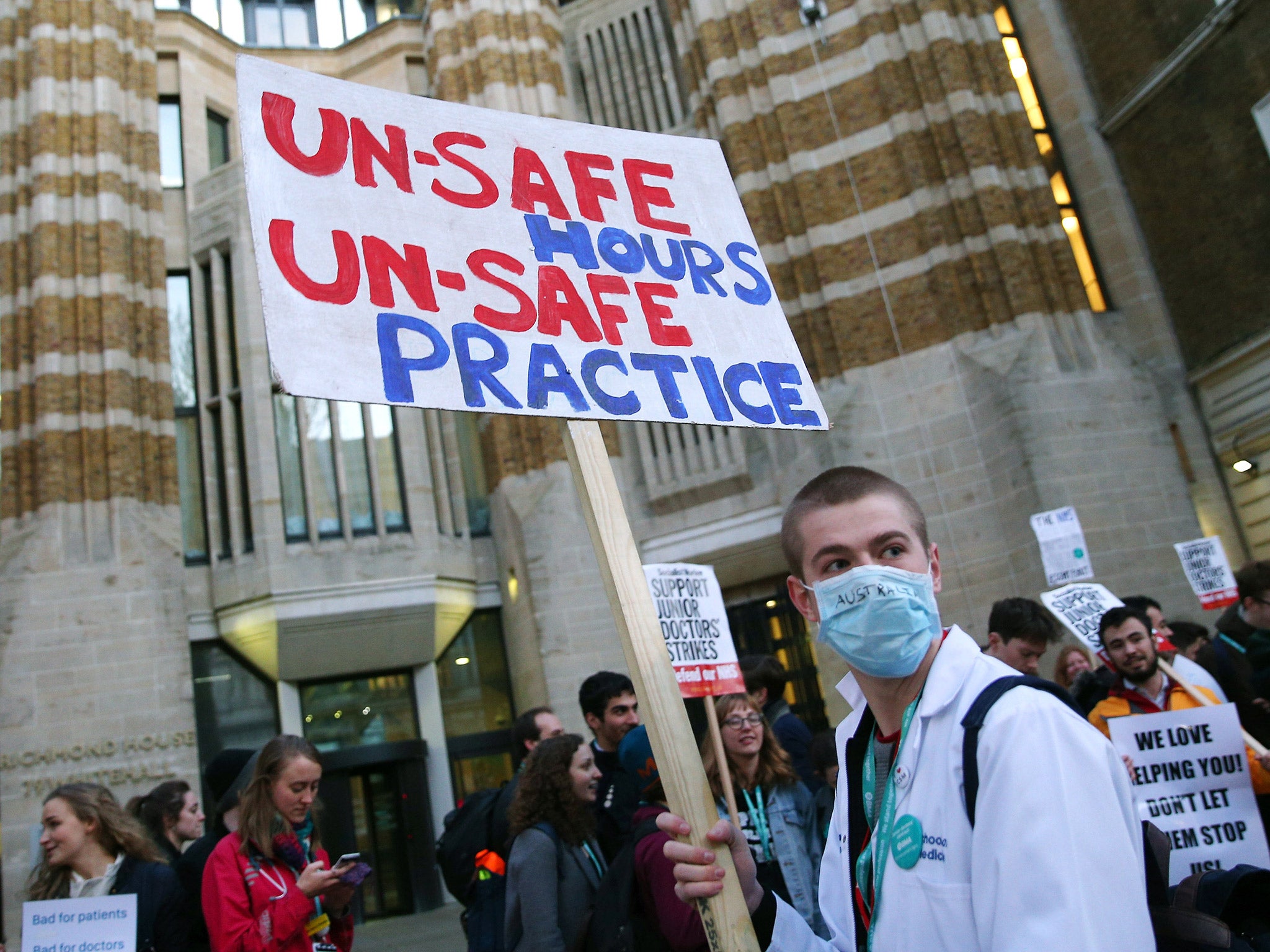Imposing the junior doctors' contract is causing a psychological crisis in our profession
A political calculation has been made that the government cannot lose face, and to impose is simply a way to demonstrate strength

Your support helps us to tell the story
From reproductive rights to climate change to Big Tech, The Independent is on the ground when the story is developing. Whether it's investigating the financials of Elon Musk's pro-Trump PAC or producing our latest documentary, 'The A Word', which shines a light on the American women fighting for reproductive rights, we know how important it is to parse out the facts from the messaging.
At such a critical moment in US history, we need reporters on the ground. Your donation allows us to keep sending journalists to speak to both sides of the story.
The Independent is trusted by Americans across the entire political spectrum. And unlike many other quality news outlets, we choose not to lock Americans out of our reporting and analysis with paywalls. We believe quality journalism should be available to everyone, paid for by those who can afford it.
Your support makes all the difference.As we get ever closer to what could be the most disastrous end possible to this industrial dispute, I am often asked whether what junior doctors are calling for has somehow become lost in the noise and anger.
As I talk to members of my profession, and students about to enter our profession, the clear message comes through.
Impose a contract and it will define the NHS and the relationship between government and the health service for a generation.
To impose is to effectively give up. It shows the loss of control and the weakness in the party that holds power. It’s this imposition that has so inflamed this situation. It is what is causing a kind of psychological crisis in our profession that we may never recover from.
A political calculation has been made that the government cannot lose face, and to impose is simply a way to demonstrate strength. The politicians throw the grenade and walk away, allowing the public, the NHS and the profession to pick up the pieces after imposition.
The hope is, that actually the contract will be ok and eventually and the politicians will be proved right. But this thinking is what is so damaging. The impact on a profession that has always given its goodwill without question, has dedicated and sacrificed personally in such a big way, will be immeasurable.
It is increasingly clear that the imposed contract in August is going to be a complete dogs’ breakfast. The government has already realised it cannot impose it on all doctors as originally stated, and are only going to do so on the very newest most vulnerable doctors.
Trusts are quietly complaining that there is too much work to do to deliver this contract safely without the support of doctors.
Recruitment figures are starting to look disastrous. Early reports suggest certain specialties are going to struggle to fill posts this summer, which basically means the current disaster in the NHS is going to be compounded. Many at the end of training, about to take up consultant or general practice roles, are simply looking elsewhere now.
So what can we as the doctors do? A trade union is always viewed as a barrier to reform. The BMA is not. On many occasions we have offered to help the government find solutions to its problems. The medical profession would be happy to work to deliver a democratically elected government’s’ policies.
But we are scientists as well as clinicians. We want to work with the government to establish the evidence base, we want to see what genuinely works for the benefit of patients, we want to test out the interventions and then we want to implement the right policies in a consensual way working constructively with government.
Now is the time for the government to make serious decisions. The junior doctors in England do not need to see a government climb-down or u-turn, despite what seems to be the view and mentality of government officials in their Whitehall bunkers.
We don’t want our generation of doctors sacrificed on the altar of political strength.
Our plea to the government is to work with us. Let’s establish the evidence base for the policy and pick the right interventions to improve the NHS.
The junior doctors would once again commit to working with the government on reforming contracts, in a constructive way, testing out interventions and ensuring they are safe and effective.
Implementing a contract together is the only way we as a country will see the true benefit of the passion and dedication of a generation of young professionals that are desperate to make the NHS thrive.
Once this sorry mess is all over, my deepest desire is to see junior doctors take their rightful place at the heart of decision-making in the NHS.
For too long we have simply been the ones subjected to decisions. Many of these talented, amazing colleagues of mine have the ideas, the passion and the dedication to improve the NHS for patients. They are desperate to be given a chance to lead the improvements in service in directions that are truly sustainable and deliverable.
For too long we have treated these amazing professionals as indentured workhorses that are simply to be abused until they break. It’s time for those with power to make decisions that truly value frontline staff. It is time to open your ears and listen to generation crying out that they do not want to be sacrificed for political expediency.
Dr Johann Malawana is chair of the British Medical Association’s junior doctor committee
Join our commenting forum
Join thought-provoking conversations, follow other Independent readers and see their replies
Comments